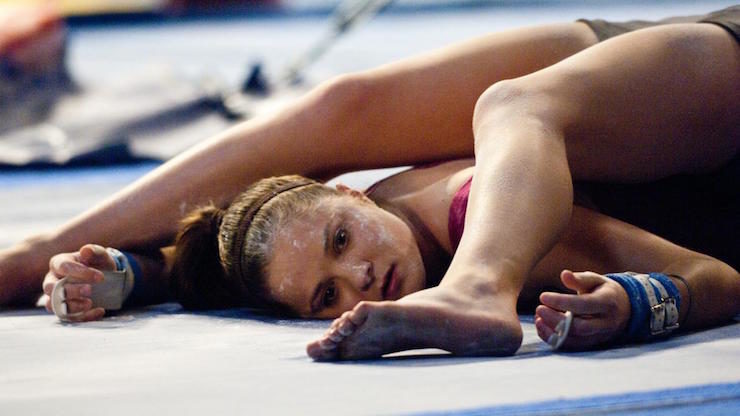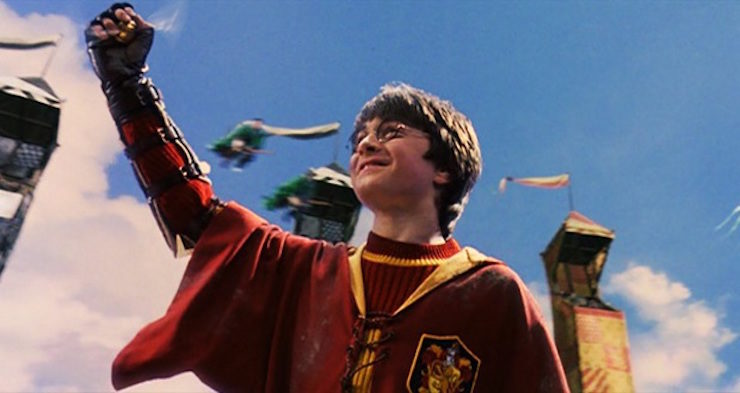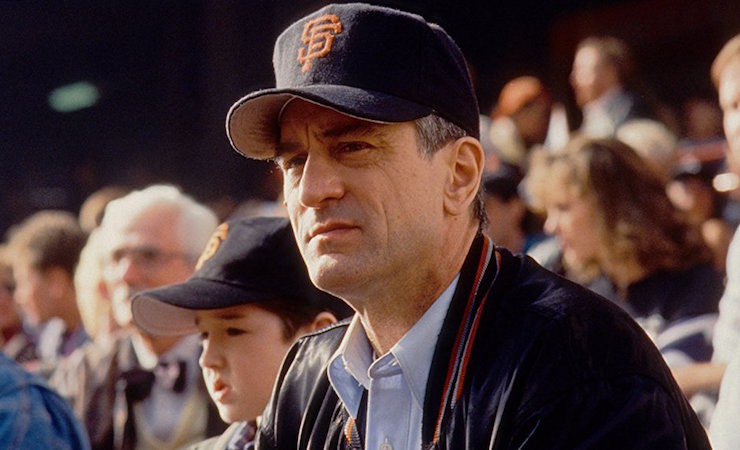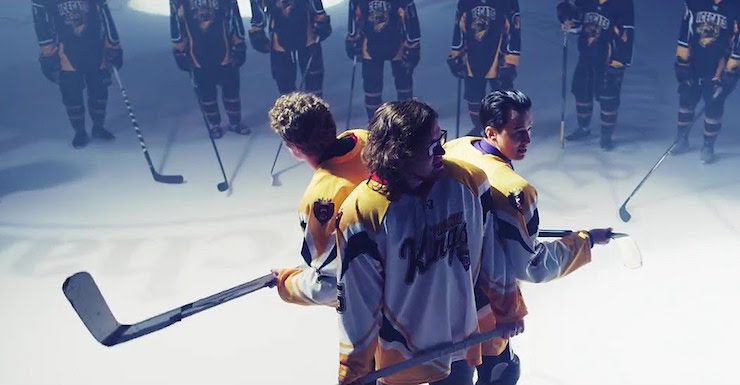It’s 2001. I’m a freshman in a large public high school, sitting on the bleachers with the other nerds on a Friday evening as two groups of boys in heavy padding scurry across the turf. I am the only one in my group actually watching the game. I don’t know anyone on the football team, or the cheerleading squad, and I never will. I’m more likely to be hit in the head with a basketball than shoot a basket. I can’t serve. I can’t even bowl. I’m a mad-at-the-world English nerd. I’m Hot Topic lite. I’m lowkey emo. I write ghost stories. The only thing I’m going to letter in is academics. I have no school spirit and I’m not a local. And yet for some reason I care whether “we” win or lose.
It was no great surprise that living in Nebraska, I’d become a football fan. In this state, Saturdays are synonymous with the color red, and since my first game in Memorial Stadium in 1998, I’d been transfixed by the way the crowd’s collective energy hovered above the playing field like an oppressive psychic force, our individual yells making up an insurmountable eternal scream. It was terrifying. And it was the only time I ever felt like I truly belonged. But in caring about something so popular, so trivial, wasn’t I betraying my outsider soul? What kind of self-respecting sensitive pseudo-goth gave a shit about jocks beating each other up for points?
I couldn’t help myself, though. My passion for sport and horror came from the same root: my ruthless bloodthirst. I’m hyper-competitive, or perhaps more accurately, terrified of failure. I’m an adrenaline junkie. I’m addicted to cortisol, the fight-or-flight stress hormone. I’m all about crisis, panic, confrontation. I’ve never seen much difference between covering my eyes in anticipation of a jump scare by James Wan or a triple jump by Michelle Kwan. The stress is less fun than absolutely unbearable, but for some reason, I just keep getting on the rollercoaster, strapping myself in, and wondering how I’m going to die this time. Ironically, this apparently is how I remind myself that I’m alive.
And I always wondered why there wasn’t more of an intersection between the two. Horror is all about games—spirit-summoning rituals, crime-solving riddles, survival traps, gladiatorial tournaments to the death—and it’s certainly all about violence. You would think that putting the game and the violence into a structured, socially-approved setting would only make it more compelling for a genre that prides itself on an evolving, tug-of-war relationship with social norms. But where were the stories about zombie football players forced to compete until their limbs fall off, or ice skaters feeding each other monstrous parasites to keep their weight down, or the washed-up tennis player who will make a deal with anyone—or anything—for one last shot at greatness? Where was my bloodsport?
Jocks Always Die

The sport story is challenging in any genre—how do you avoid making it a technical play-by-play?—but it seems to be a uniquely poor fit for horror. Girls like me—responsible, bookish good girls—tend to do well in horror movies. Jocks don’t. Jocks bully nerds, and get punished for it. Jocks don’t believe in the monster, and get punished for it. Jocks think they can take on the monster, and get punished for that, too. The same motivational quotes emblazoned in gyms across the country—“You miss 100% of the shots you don’t take!”—are a horror-jock’s famous last words. “Fuck death!” says Lewis the quarterback in Final Destination 3, moments before weights crush his head: “I just win! That’s all I know how to do!” If there is one law of horror, it’s that you can’t get away with such bravado.
Jocks, that is, represent power—they’re the apex predator on top of the food chain, and horror dwells on the struggles of the downtrodden and vulnerable. This year’s horror movies, for example, were led by among others bullied children (It), orphaned children (Annabelle: Creation), a grieving mother (A Dark Song), and a black man in a community of white people (Get Out). Isolation and helplessness heighten the sense of danger, and—speaking for myself—horror fans can often relate to the weak and wounded. Incidentally, I think this is also why there aren’t very many horror movies centered on politicians—their power and privilege makes them painfully uninteresting except as monster food or Society-style villains. The irony, of course, is that no one will fall in love with an underdog more quickly than a sports fan—our resentment of unfair advantages and our love of drama are near-universal.
In horror world, however, all jocks seem to represent hegemonic culture and are portrayed as aggressive and stupid, as hapless foils destined to get themselves killed. For once, they are the one-dimensional expendables. For once, the story doesn’t revolve around them. For once, theirs is a story that isn’t worth telling at all. You might get a two-minute sequence of a doomed gymnast performing two nerve-wracking routines in Final Destination 5, but you’re not there to cheer for poor Candice (“Go hard this time!” her boyfriend urges her, “Let’s be aggressive!”). You’re there for the grotesque death splat. And if the movie’s stocked with foolish young athletes—as in the track and field-themed ‘80s slasher Graduation Day—all you’ve really got is a guarantee of a lot of creative deaths-by-sporting-goods. As much as I’m looking forward to Ahockalypse, I suspect it’s going to be a lot more about zombie-splatter than it is about hockey.
Good Guys Always Win

Athletes fare better in the next neighborhood over: fantasy. Here they aren’t beating up nerds and getting eaten by monsters; they’re bringing hope to the common man. This is the larger-than-life heroism of your 1980s’ kid-friendly sports movies, just with an additional halo or two. In Field of Dreams, ghostly baseball players help a baseball fan find peace and resolution; in Angels in the Outfield, baseball-loving angels help a young baseball fan’s playoff dreams come true. The ghost of a basketball player tries to help his brother and team to victory in The 6th Man. Though these plots are anchored by the supernatural, there is no sense of malice, no sense of threat. Even Tom Gordon, in Stephen King’s The Girl Who Loved Tom Gordon, is a beacon of light in the darkness for young Trisha.
Sport also plays a more mundane, world-building role in fantasy and science fiction, as exemplified by Quidditch (Harry Potter) and podracing (Star Wars). Their inclusion in these epic, civilization-defining sagas is illustrative of the role sports play in our lives—not only as a diversion and an outlet for our competitive instincts, but as a microcosm of our moral universe. Archetypal heroes have all the same qualities star athletes are supposed to have—a charmed combination of talent, grit, and heart—and in these stories, beating the athletic competition is just a prelude to beating the Big Bad further down the hero’s journey. The plucky kids of Gryffindor seem to win the Quidditch Cup an awful lot. Anakin Skywalker first shows signs of being a chosen one when his superior podracing skills win him his freedom. That’s how we want it to go, isn’t it? Heroes win. Villains lose.
The unlucky athlete that finds themself in a horror story is necessarily denied this simple heroic arc. Horror is intended to terrify and disturb, to remind us that no one is safe and some monsters cannot be outrun. That’s not a story that NBC is going to tell when they showcase young Olympic hopefuls overcoming hardship and vanquishing demons through the Wheaties-infused power of training, dedication, and guts. Sports stars are supposed to inspire us, to serve as the proud and brave role models that we’ve failed to be. They’re supposed to conquer. They’re supposed to win. They’re supposed to be the best. And there isn’t much room for that in horror. Horror is for the guilty and the gutless; the losers and the lost.
The Horror of Bloodsport

As any sports fan knows, however, the sanitized, pre-packaged version of sports is a feel-good lie. I loved Space Jam as much as the next nine-year-old, but looking back, the best part of that movie was watching Michael Jordan humiliate himself trying to play baseball (why is it always baseball?). For most of us, the twists and turns of life hew much closer to a rollercoaster’s plummeting dives than its skyward climbs. And real sport is infused with horror, too.
I like to say that all sport is bloodsport, no matter how much physical contact is actually involved, for the simple reason that all sport is based on the single dark desire to win by beating others. You cannot share a trophy; with the occasion of the rare Olympic tie, sport is zero-sum and winner-take-all. The athlete finds their place in the world much as the monster Indominus Rex does in Jurassic World: by “killing” everyone in their way. And when winning is everything, people will do anything to win: take performance-enhancing drugs; bribe judges; sabotage races; end marriages. In two of my favorite sports, men have attacked top-ranked female competitors to give their rivals an advantage (Monica Seles was stabbed during a match; Nancy Kerrigan was bludgeoned after a practice). My other favorite sport is littered with cover-ups of violent incidents designed to keep star athletes in the game—a favorite sin of my beloved Nebraska Huskers. And fans in devotional “cults,” well, we’re so desperate to help that we use voodoo. It’s tempting to relegate these misdeeds to the opponents and rivals (the “bad guys”), but infinitely less interesting—it was crucial that “The Tell-Tale Heart” and “The Monkey’s Paw” be told from the perspective of the transgressor, that they submerged the reader in the powerful fever-dream of desperation. Desperate times call for desperate measures, and only once you declare that everything is on the table do you truly see the lengths to which you’re willing to go.
Doing terrible things in the name of glory is probably the most obvious intersection between sport and horror, but competition exacts many different types of costs on the mind and the soul. Kathy Ormsby ran straight off the track and off of a bridge during an NCAA 10,000-meter race. Derek Boogaard died addicted to painkillers after a career spent taking punches in the NHL. Fans of soccer, hockey, basketball, baseball, and even handball have tried to burn the world down after a win. And every year, it seems, one or two fans—seemingly, mostly of Premier League soccer—will commit suicide after a loss. There’s a bloodshot madness in sport that echoes both religion and war, especially when champions are lauded as gods (but what type of gods?) and the thought of losing turns apocalyptic (so what follows?). The disproportionate, manic, obsessive emotional force that sport wields—especially relative to its “real-world” impact—creates a distorted, nightmarish sort of tunnel-vision that the horror genre understands best of all.
Which leads us to that greatest, darkest truth of all: it’s not always a happy ending. In fact, unless you’re a Michael Phelps fan, it’s usually not a happy ending. At any given game in any given season, you and your champion are probably being defeated. You’re probably getting your souls ripped out and your throats slashed as you run, screaming in agony, for the getaway car. And you’re probably getting resurrected in a few days, weeks, or months to do it all over again, as if trapped in your very own Lemarchand’s box. Even as—especially as?—someone who’s spent over a decade crying with Roger Federer, I promise you that I know all about the abject depths of vicarious suffering. I have cried, I have raged, I have begged and bargained with any unseen force that might be listening in the heavens or the shadows to please, please have mercy on us. Ironically, it’s exactly that moment of curb-stomped defeat and humiliation that threads all of us together across space, time, and pursuit—even across allegiances. Sports fans know this. Horror fans do, too. As Gemma Files so succinctly puts it, “pain is the one thing everybody understands.” So you see, it isn’t really about the laurels and the trumpets and the victory parade. It’s about the journey—and that road is dark, twisting, and brutal.
With that in mind, below are just a few examples of sport-horror crossovers that take you down this road. You’ll notice that inspirational angels armed with motivational quotes are entirely absent here. Instead, most of these stories focus on the athlete as an object of misplaced worship. Considering horror’s complicated relationship with religion, this isn’t surprising—though I do think it’s only the tip of the iceberg.
The Fan (dir. Tony Scott)
Based on the thriller by Peter Abrahams, The Fan is told from both sides of the coin—a perpetually-infuriated, knife-wielding baseball fan (Robert DeNiro) who believes baseball to be fair when life is not, and the star baseball player (Wesley Snipes) shouldering expectations of glory and martyrdom. The Fan aptly pinpoints the essential mismatch between the fan’s idealized perception of the game—as a reflection of our moral universe, a place where good guys win and good guys are, well, good—and that of the flesh-and-blood, imperfect athlete who has to play it. “I want you to hit a home run,” the fan demands of his idol, when the stakes are literally life and death. “Are you serious?” the slugger rightfully responds. The Fan is also so absurdly malicious in its send-up of sport—from the deranged fan’s insistence that “positive things happen to positive thinkers” to the bloody ending set to schmaltzy music—that it does leave you wondering: why then does anyone play baseball? Why does anyone love it?
“The New Ancient of Sophocles High” (Marco Kaye)
“Sports were the weirdest thing on Earth,” says A.J. Travis, a high school Greco-Roman wrestler, “Why did people tether their emotions to all this silliness?” A.J. is wrestling to stay close to his dead father and get a scholarship, but doesn’t have much stake in his own personal glory. His school and his mother, however, are a different story, and pressure A.J. to permanently don a magic mask handed down by the Gods that will channel the superhuman capabilities of an ancient Greek warrior—the ultimate larger-than-life athlete, as long as you don’t look them in the eyes, “for they are the wells of incredible sadness.” The absurdity of the premise is no more outlandish than other very real absurdities of sport—from the bombastic costumed mascots to the socially-sanctioned binge-and-purge cycles that are used to manipulate weigh-ins. For A.J., the mask is just another degradation. Because once you are “Stronger than Hurt,” aren’t you the ultimate expendable? Is being a living God in fact beneath being human?
You Will Know Me (Megan Abbott)
Devon Knox, the dark star at the center of You Will Know Me, is a talented young gymnast on the Olympic fast-track who serves as the raison d’être for her family and gym. Though the world turns around her, Devon herself is mostly a cipher, more a symbol of perfection, power, and grace than a flesh-and-blood teenaged girl. “She’s like a machine,” another parent says of Devon, “A perfect machine.” That is how we gaze, starry-eyed, at athletes: we project our values and ideals upon their performances as if there is something essentially precious about superior balance and flexibility; as if their potential for achievement must be protected at all costs, even if someone has to die. Of course, the athlete is not a mirror. There is a real girl in there, one who resents the fact that “you never want to hear what it’s like being me.” When Devon finally emerges like a black butterfly from the cocoon her parents and her sport have wrapped her in, her reality is darker and starker than anyone in the bleachers can imagine: “Her heart was different.”
“Hell’s Event” (Clive Barker)
Hell, Clive Barker writes, “never lacked competitive spirit.” Hell sustains itself on the foolhardiness of hyper-competitive and desperate humans willing to make bargains they cannot keep—willing to play games that they should know they cannot possibly win. Joel Jones has been taught to “be barbaric” in competition because “there’s no joy for losers.” During a charity race through London, he’s shocked to see his fellow runners inexplicably collapsing, and even more bewildered when one of his rivals even encourages—nay, urges—him to “Run for your life!” Good-and-evil absolutism is standard fare among fans, and though it’s usually said in jest, a little part of us does feel that the stakes really are that high—that our opponent, “the thing to be surpassed,” actually is an enemy on a mortal, moral scale. “Hell’s Event” does a wonderful job interlacing the outsized, oft-religious symbolism we attach to sport with the bloody, gritty, adrenaline-soaked reality of competition as experienced by the athlete.
So, here’s to more bloodsport in horror! I like to think we’re on our way. Last fall, I was thrilled to get a brief glimpse of what could be in the second episode of the first season of The Exorcist. High-schooler Casey Rance gets hit in the knees by a nasty opponent in a lacrosse game. “Watch it,” she says. “Watch what?” her opponent snaps back. During a water break, Casey glances at the bleachers and sees a man sitting next to her sister, a man that doesn’t belong. He waves. She smiles back. Back in the game, Casey’s archenemy shoves her down again, harder this time. “Get up, Case!” her sister yells—and like any good competitor, Casey gets up. This time she stares at her opponent, eyes glinting with an infernal mischief, until said opponent’s leg snaps—Casey’s will to win now so great that it’s inhuman and inhumane. Playing like a woman possessed, so they’ll say.
 Nadia Bulkin writes scary stories about the scary world we live in, three of which have been nominated for a Shirley Jackson Award. Her stories have been included in volumes of The Year’s Best Horror (Datlow), The Year’s Best Dark Fantasy and Horror (Guran) and The Year’s Best Weird Fiction, and in venues such as Nightmare, Fantasy, The Dark, and ChiZine. Her debut collection, She Said Destroy, was published by Word Horde in August 2017. She has a B.A. in political science, an M.A. in international affairs, and lives in Washington, D.C. She watches tennis with her hands over her eyes.
Nadia Bulkin writes scary stories about the scary world we live in, three of which have been nominated for a Shirley Jackson Award. Her stories have been included in volumes of The Year’s Best Horror (Datlow), The Year’s Best Dark Fantasy and Horror (Guran) and The Year’s Best Weird Fiction, and in venues such as Nightmare, Fantasy, The Dark, and ChiZine. Her debut collection, She Said Destroy, was published by Word Horde in August 2017. She has a B.A. in political science, an M.A. in international affairs, and lives in Washington, D.C. She watches tennis with her hands over her eyes.










